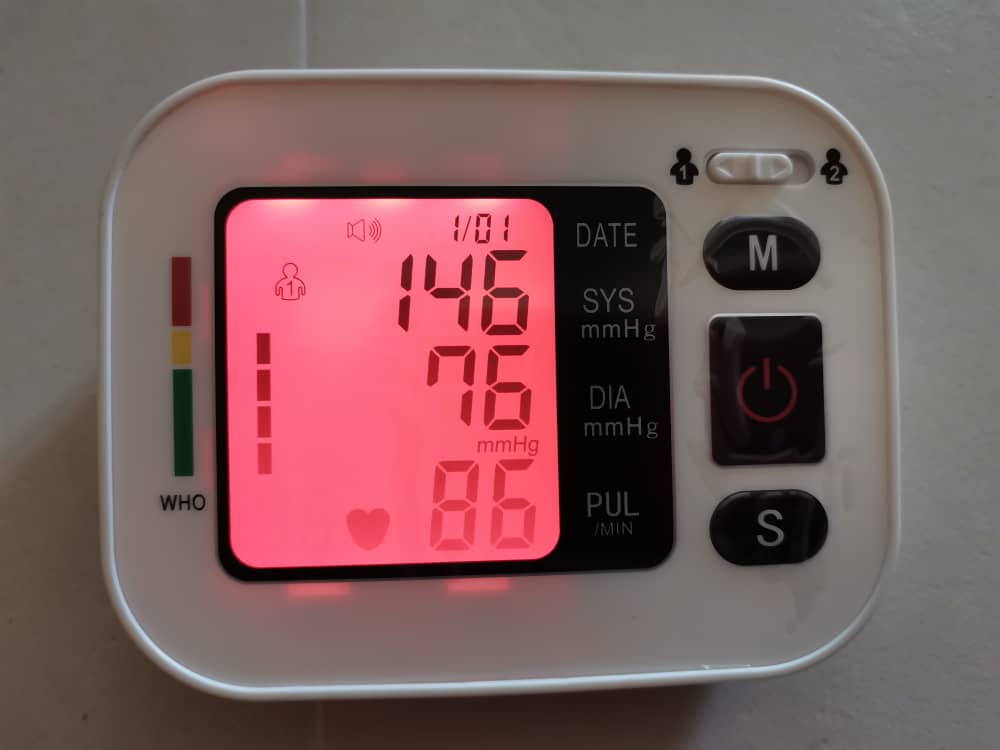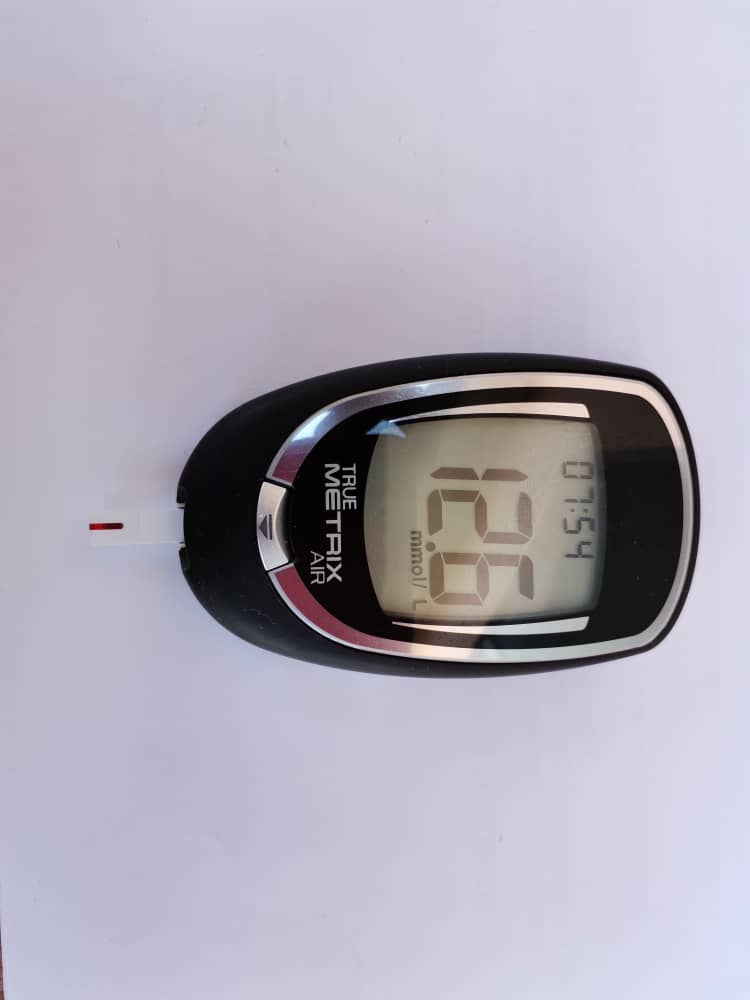A GNA Feature by Muniratu Akweley Issah
Accra, Oct. 26, GNA – Mr Frank Addo, a 38-year-old commercial driver and a family of five is currently bedridden, suffering from a stroke.
Mr Addo, a vibrant family man was suddenly attacked by a stroke whilst driving and could no longer continue his journey, and was rushed to the hospital.
Sadly, he could no longer recognise his family and could no longer wake up to do anything all by himself.
Medical checks confirmed that Mr Addo was hypertensive unknowingly, at that moment and was also diagnosed with type II diabetes, which was also high.
His wife, Madam Vida Owusu said her husband was not aware of his condition since he hardly went for a checkup or screening to know his status.
She said her husband hardly stayed at home to rest and usually spent most of his time with friends for a routine drink-up after the day’s work.
Mr Addo is currently incapacitated and can no longer care for his family, a situation that has brought financial constraints to his family.
His wife who worked in a corporate environment resigned from work to stay at home and take care of him, putting a financial burden on his wife and family members.
WHO
According to the World Health Organisation (WHO), Non-Communicable Diseases (NCDs) kill 41 million people each year, equivalent to 74 per cent of all deaths globally.
It said each year, 17 million people die from NCD before age 70 while 86 per cent of these premature deaths are estimated to occur in low- and middle-income countries.
NCDs are caused by rapid unplanned urbanisation with unhealthy lifestyles and population growth. Unhealthy diets and a lack of physical activity may show up in people with high blood pressure, increased blood glucose, elevated blood lipids and obesity.

Available statistics show that NCDs are on the rise globally and Ghana’s situation is not different from that of the world’s situation.
Dr Efua Commeh, Acting Programme Manager, Non-Communicable Diseases (NCDs), Ghana Health Service (GHS), disclosed that about 53 per cent of Ghana’s mortality rate was due to NCDs, representing more than half of the country’s recorded deaths.
She said: “A few years back, you would have been more worried about infectious diseases; cholera, diarrheal diseases, respiratory drug diseases and HIV amongst others but currently, the situation has changed.”
She expressed worry, as lifestyle diseases including hypertension, and cancers have become common, affecting the lives of Ghanaians as the country develops into low middle-income country.
“It is a natural phenomenon and as our lifestyles are changing, we are adapting to more unhealthy risk factors. So, risk factors such as cigarette smoking, alcohol intake, unhealthy lifestyles, physical inactivity, overweight, and obesity seem to be on the rise, and once the risk factors are high then, the resultant effects go up as well.
An estimated 1.28 billion adults aged 30-79 years worldwide have hypertension with (two-thirds) of them living in low- and middle-income countries, and more than 700 million people are living with untreated hypertension.
Causes of hypertension
Hypertension is caused when the pressure in the blood vessels is too high, which usually develops over time. Blood pressure is considered high when the temperature is at 140/90 mmHg and above.
In 2022, the Ghana Health Service (GHS) recorded over 600,000 Outpatient Department (OPD) cases of hypertension. The figure included already-diagnosed and newly diagnosed persons.
According to the WHO, hypertension killed 190,000 Ghanaians in 2019.
Dr Efua Commeh, who spoke to the Ghana News Agency (GNA), acknowledged the fact that the situation was challenging since hypertension is said to be a silent killer and does not show any symptoms, adding that people get to know their condition when they begin to experience complications such as stroke, kidney failure, and heart attack among others at an advanced stage.
She said the majority of Ghanaians do not know their health status, particularly the ‘silent killer,’ the hypertension disease
She said: “A lot more of our people will not go to the hospital when they are sick and we are seeing more of the complications in our system, which shows that there are lots of cases that are not diagnosed, and they are coming either brought in dead because suddenly collapsed or had a stroke. The “what a shock” oh there was nothing wrong with him or her, and they just collapsed, mostly occur as a result of complications of hypertension.”
“We are also observing that more and more young people are coming down with these complications, which are serious. At the Renal Unit of the Korle-Bu Teaching Hospital, we are having to treat a lot more people for kidney failure and one of the commonest risk factors is high blood pressure,” she added.
Dr Commeh noted that lifestyle changes such as the consumption of unhealthy foods and drinks predisposed Ghanaians to NCD, adding that the fizzy drinks that children routinely take to school and all over the place, tend to predispose us to non-communicable diseases.
We are also observing that more and more young people are coming down with these complications as relatives develop kidney failures, putting a huge burden on their families while affecting the country’s productive workforce.
Meanwhile, the Acting Programme Manager made it known that type II diabetes was also on the rise, affecting many young people due to lifestyle situations as well.
Diabetes
“Diabetes for me is worse than hypertension because of how it destroys every blood vessel in the body. So, the complications creep up on you before you realise your heart is affected, your kidneys are affected, your limbs are being affected, and sometimes you need amputation and all that.”
And then, the additional things like obesity, alcohol, cigarette intake, raised blood sugar, raised cholesterol. These are risk factors that predispose people to diabetes.
Air pollution has also been identified as a major cause of NCDs as the toxins that people breathe in predispose them to the disease. These are smoke inhalation from exhaust pipes, vehicular fumes, burning of tires and rubbish, and factories that produce a lot of smoke.
Dr Commeh stated that as more people grew up into adulthood, awareness creation about the disease was necessary to enable the public to develop healthier habits, adding that it was important to start with children at a younger age to inculcate in them, the habit of eating healthy foods and living a healthier life.
“We need to know that the NCDs are on the rise, and we need to be aware that for most of them, our lifestyle choices will make a lot of difference and as a family, it is important that we adopt healthier lifestyles.
“Dietary issues are important when it comes to our children so that they grow up knowing healthier options and once they practise, it becomes habitual and recommends their parents to follow suit.”
She urged the public to engage in physical activity by ensuring regular exercises or incorporating a walk in their routine activities, which would help to strengthen the muscles and advised that those who could not afford the gym develop strategies to help them become active.
“If your work is such that you cannot undertake structured physical activity or go to the gym, just walking around your house, and doing it a number of times would help. Taking 10,000 steps a day is ideal, if not the least you should do is about 6,000 steps a day, to prevent overweight and obesity, which are risk factors for NCDs. “

Workers are advised to get off their chairs and move around every two hours to exercise their muscles or climb up and down the staircase a couple of times every two hours.
Dieting
She emphasised the intake of fruits and vegetables as part of everyone’s diet while cutting down on sugar and salt as well as avoiding fatty foods, urging the public to minimise the use of seasoned cubes for food preparation as most of them have very high salt content.
She expressed worry that most of the youth had resorted to inhaling shisha, which has so much nicotine, she said these things might seem fashionable, but, the effect could be detrimental.
Prevention, they say, is better than cure and experts keep drumming home the need to ensure prevention of diseases, particularly hypertension, by adhering to information and education provided and ensuring a much healthier nation.
Annual medical checkups according to experts are very necessary, at least once a year, just go and get your labs done, blood sugar, and lipid profile, let them do a review and if there is an issue then you can be linked to care while persons diagnosed already are advised to give attention to their medication to control their conditions.
The Programme Manager said funding had become necessary and called on government, institutions, and organisations to commit resources towards the prevention and control of NCDs, as the disease puts a greater burden on the country.
She believed that committing enough resources for education, prevention, and management of the disease as well as training would help attain Sustainable Development Goal Three, which seeks to reduce by one-third premature mortality from non-communicable diseases through prevention and treatment and promote mental health and well-being.
“We need funds to undertake training and logistics because you can’t ask someone to check for blood pressure when you don’t have the machines to check, we need funding to produce educational materials to educate the public about best practices,” she said.
GNA